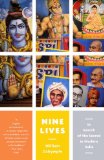Summary | Excerpt | Reading Guide | Reviews | Beyond the book | Read-Alikes | Genres & Themes | Author Bio

A Novel
by Bharati MukherjeeLike many fictional characters who have experienced setbacks, Anjali Bose would love to reinvent her life. At nineteen, the green-eyed, youngest daughter of a Bengali couple flees her family after an attempt at arranged marriage results in violence. She subsequently protects herself from the emotional fallout by adopting her anglicized persona, "Angie," while shedding traces of her rural upbringing.
Arriving in Bangalore as the protogé of tutor Peter Champion, she soon takes up residence in the Raj-era Bagehot home, a boarding house for working women, where she finds difficulty befriending anyone. Events gradually overwhelm her - from the public ransacking and dismantlement of a colonial institution, a case of identity theft and a family member's death to a new romantic involvement - and Angie must depend on others to help her find her way through.
Although Mukherjee's work begins with the familiar plot of a daughter who is not enthused by her parents' decisions about her future, the author is careful not to allow generational differences to serve as simple catalysts for trouble. Miss New India is more than a summation of "traditional" versus "modern" ideals; indeed, after the first several chapters, her family remains peripheral, and the conflict between Angie and her parents is resolved, though not healed, by avoiding the issue.
The author is instead concerned with portraying the gray area between the end of childhood and the beginning of independence. Her perspective on the unsettling years after completing an education but before finding meaningful employment is all the more invigorating when set against a glitzy city that draws out vulnerabilities in Angie's character. Angie is a calculating, veteran procrastinator; restless; insecure; eager to emulate the trendsetting lives of her peers; essentially pragmatic, though prone to rashness; easily flattered; overly trusting; and very intelligent. This perilous yet understandable combination of personality traits is shared by many similarly enterprising young women and will likely ring true to many readers.
For example, in one memorable and discomforting scene, Angie recklessly volunteers personal information during the course of a job interview, highlighting her struggle to maintain an unwavering mask of competence, her tendency to "wing it" and, perhaps most of all, the unusual and unique flair that ultimately draws the attention of others.
As one of several "Miss New Indias" (a term coined by a fictional newspaper columnist in the book), Angie is part of a rising generation of women who:
...arrive by plane, by train, even by intercity bus. They come
from the great cities and the mofussil towns... They represent all
religions, all languages. They come bearing school-leaving certificates,
letters of reference from old teachers, but most important, bearing
hope and energy that is infectious.
Mukherjee deftly details the transition from Angie's idea of adult singlehood to a more tempered version of what "freedom" truly entails. That Angie transcends the move to Bangalore through a combination of luck and the kindness of others rather than through determined work, may leave some readers questioning whether she is a genuinely strong character; she could easily be misread as a self-involved person who turns others toward her favor only when her own foolhardy decisions lead to problems. But Mukherjee balances the more adolescent moments in Angie's journey with flashes of maturity. She also raises worthy questions of betrayal and resilience with compassion toward her protagonist.
Miss New India provides an entertaining, sobering look at how a young woman's crisis results in the knowledge that, despite her fears, she possesses all the resources needed to thrive.
![]() This review was originally published in The BookBrowse Review in June 2011, and has been updated for the
June 2012 edition.
Click here to go to this issue.
This review was originally published in The BookBrowse Review in June 2011, and has been updated for the
June 2012 edition.
Click here to go to this issue.

If you liked Miss New India, try these:

by William Dalrymple
Published 2011
A mesmerizing book that illuminates the remarkable ways in which traditional forms of religious life in India have been transformed in the vortex of the region’s rapid change.

by Thrity Umrigar
Published 2010
Filled with satisfyingly real characters and glowing with local color, The Weight of Heaven is a rare glimpse of a family and a country struggling under pressures beyond their control. Umrigar illuminates how slowly we recover from unforgettable loss, how easily good intentions can turn evil, and how far a person will go to build a new world for ...
To make a library it takes two volumes and a fire. Two volumes and a fire, and interest. The interest alone will ...
Click Here to find out who said this, as well as discovering other famous literary quotes!
Your guide toexceptional books
BookBrowse seeks out and recommends the best in contemporary fiction and nonfiction—books that not only engage and entertain but also deepen our understanding of ourselves and the world around us.